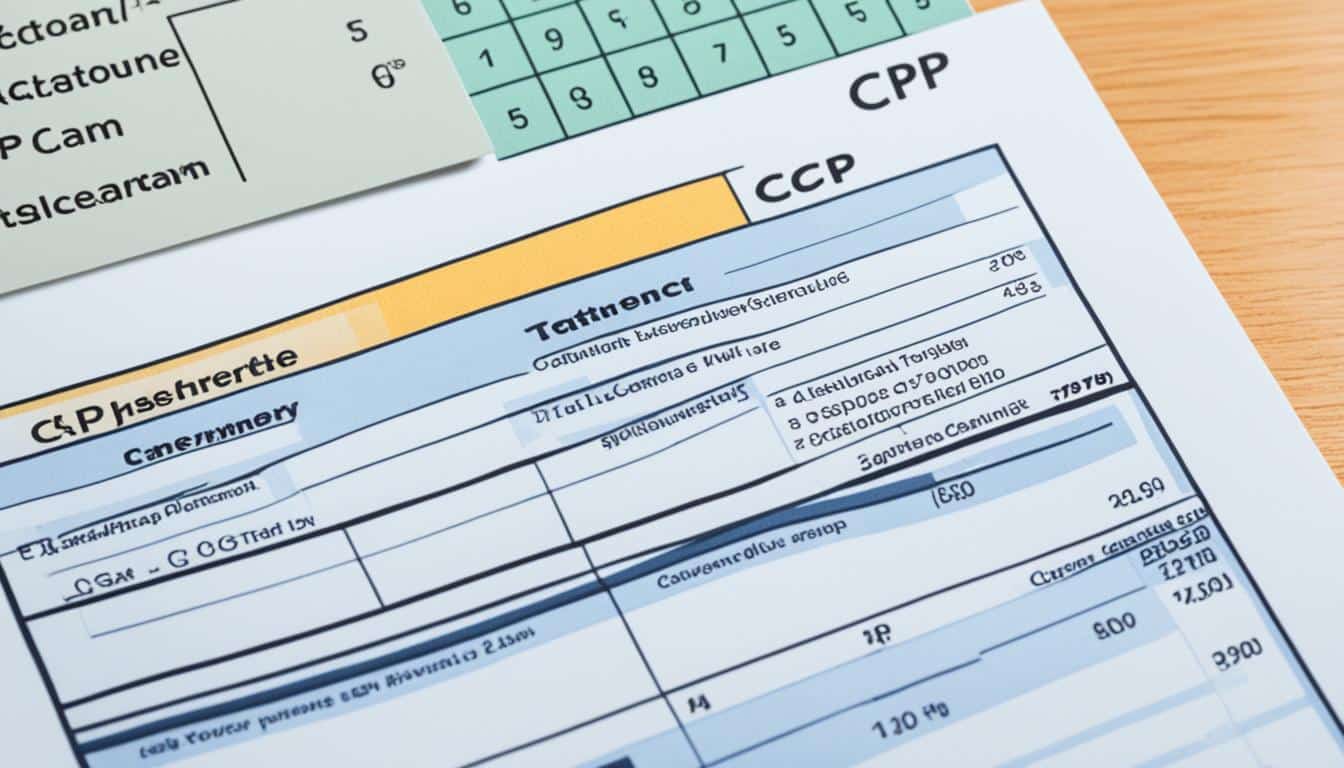Hey there, fellow wage earners! Ever wonder where those chunks of your paycheck go? Let’s explore the world of CPP contributions and EI premiums. These taxes might seem like a hassle, but they help you later.
In Canada, the Canada Pension Plan (CPP) and Employment Insurance (EI) are like a safety net. For 2024, everyone pays 5.95% for CPP, and 1.66% for EI up to $63,200.
Now, you might ask, are these contributions tax deductible? We’re here to tell you. If you’re an employee wanting a bigger refund or an employer looking to save, we’ve got the details you need.
Key Takeaways
- CPP and EI are mandatory payroll deductions in Canada
- CPP contribution rates for 2024 are 5.95% for both employees and employers
- EI premiums are 1.66% for employees, with employers paying 1.4 times that amount
- The tax treatment of these contributions differs for employees and employers
- Understanding these deductions can help optimize your tax strategy
Understanding CPP and EI Contributions in Canada
Are you ready to learn about payroll deductions? Let’s explore Canada Pension Plan (CPP) and Employment Insurance (EI) contributions. These are key for your retirement savings and financial safety.
What are CPP contributions?
CPP contributions help you save for retirement. In 2024, you’ll give 5.95% of your earnings up to $66,600. Your employer will match this. If you work for yourself, you pay both parts. That means you’re covering twice the cost!
What are EI premiums?
EI premiums protect you if you lose your job. You’ll pay 1.66% of your earnings up to $63,200 in 2024. Your employer pays 1.4 times your share. It’s like they’re saying, “We’ve got your back, and then some!”
Who is required to make these contributions?
If you’re 18-70 and earn over $3,500 a year, you’re in the CPP group. Most employees must pay EI premiums. Self-employed people can choose to pay into EI for extra benefits. It’s like picking your own adventure in payroll deductions!
- Employees and employers share CPP contributions
- EI premiums are mandatory for most employees
- Self-employed individuals have options for both programs
These contributions are more than just deductions on your paycheck. They’re investments in your future and a safety net for surprises. So, next time you see these deductions, be proud of yourself for being an adult!
Are CPP and EI Contributions Tax Deductible?
You might wonder about the tax effects of your CPP and EI contributions. Let’s look closely at these payroll taxes and how they impact your wallet.
For employees, you can’t directly deduct CPP contributions and EI premiums. But, you get a 15% federal tax credit for your contributions. It’s like a thank you from the taxman.
Employers, you’re lucky! You can deduct your CPP and EI contributions as business expenses. This helps your company’s profits.
Self-employed people, listen! You have two roles here. You can deduct the employer part of your CPP contributions and get a tax credit for the employee part. If you’re paying EI, those premiums are also deductible.
- Employee CPP contributions: 5.95% in 2023
- Employee EI premiums: 1.58% of insurable earnings
- Maximum annual CPP contribution: $3,754.45 (2023)
- First $15,705 of taxable income exempt (2024)
Most workers aged 18 to 70 must pay these payroll taxes. But, if you’re 65 to 70, you can stop paying CPP by filing a CPT30 form. You can only do this once a year.
Tax Implications for Employees and Employers
Are you ready to learn about payroll deductions? We’re going to explore the tax side of CPP and EI for everyone. It’s like a ride full of twists and turns, but with tax credits at the end!
Employee tax considerations
Your paycheck might seem smaller because of CPP and EI contributions. But, you can get a tax credit for these on your T1 return. In 2021, you paid 5.45% for CPP and 2.21% for EI, or 1.68% in Quebec. Think of it as saving money with a tax benefit!
Employer tax benefits
Employers, you also get something out of this deal! You can deduct your part of CPP and EI as business expenses. This is a thank you from the tax system for being a good employer. But, remember, not deducting these can lead to fines of 10% to 20%. The CRA is serious about payroll taxes!
Self-employed individuals and CPP/EI
If you’re self-employed, you handle both employee and employer roles. You pay 11.9% for CPP in 2024, but the employer part is tax-deductible. For EI, you can choose to pay only the employee rate of 1.66%. It’s like getting the best of both worlds, but with more paperwork!








